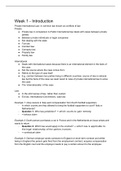College aantekeningen
Class notes Conflict of Laws week 1-5 (first half)
- Vak
- Conflict Of Laws
- Instelling
- Tilburg University (UVT)
The summary contains the weekly topics which are discussed throughout the course. The document contains the following topics: Introduction of private international law, Marriage and Divorce, Matrimonial Property, Parental Responsibility, and Child Abduction.
[Meer zien]




